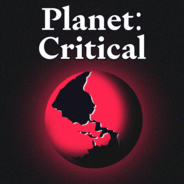Brian Czech, founder of the Center for the Advancement of the Steady State Economy, is an ecological economist and former conservation biologist. Brian joined me just after returning from COP15 and, thankfully, says the fallacy of economic growth is finally being discussed at these critical conferences.On the episode, Brian explains the relationship between economics and the planet’s biosphere before introducing steady state economics, an economic model which prioritises stability and the protection of planetary boundaries. He also describes his time working for the US government, and walks us through the trophic theory which dismantles any techno-utopian argument that we can innovate our way out of the climate crisis and continue to enjoy growth for growth’s sake.Planet: Critical investigates why the world is in crisis—and what to do about it.© Rachel Donald Get full access to Planet: Critical at www.planetcritical.com/subscribe

PolitikWirtschaftTalk
Planet: Critical Folgen
Planet: Critical is the podcast for a world in crisis. We face severe climate, energy, economic and political breakdown. Journalist Rachel Donald interviews those confronting the crisis, revealing what's really going on—and what needs to be done. www.planetcritical.com
Folgen von Planet: Critical
231 Folgen
-
Folge vom 12.01.2023The Steady State Economy | Brian Czech
-
Folge vom 22.12.2022Solving the Climate Crisis | RoundtableIn July, I recorded a roundtable with six of my former guests. The aim was to create an interdisciplinary assessment of the climate crisis, and what to do about it. Today, you can listen to the roundtable here, or watch it on Youtube.There were six fascinating presentations, each followed by a round of questions. This is what to expect:Maximum Power Principle in Biology & EconomicsCarey King, research scientist and Assistant Director at the University of Texas Energy InstituteGlobal Climate CompensationHenrik Nordborg, Physics Professor and Renewable Energy and Environmental Technology Program Director at the Eastern Switzerland University of Applied SciencesMEER & Warming MitigationYe Tao, Physicist and FounderCarbon Credit CurrencySteve Keen, Economist and AcademicEconomy 3.0: Networked Societies & Energy StandardChris Cook, Senior Research Fellow at the Institute for Security and Resilience Studies at University College LondonOligarchy & Energy Systems PrinciplesSally Goerner, Director of Edinburgh University’s Planetary Health LabPlanet: Critical is 100% independent and reader-funded. If you value it, and have the means, become a paid subscriber today!© Rachel Donald Get full access to Planet: Critical at www.planetcritical.com/subscribe
-
Folge vom 15.12.2022Message From The Future | Wendy SchultzWendy Schultz is an academically trained futurist with over thirty-five years of global foresight practice. Director at Infinite Futures, she has designed futures research projects for NGOs, government agencies, and businesses.Wendy and I discuss the Law in the Emerging Bio-Age report she recently published, which asked how legal structures can support second chances at improving human relations with living systems and our planet. We also discuss how to bridle the finance industry to support a just transition, the role of activism, governments’ relationship to information, and, more generally, how to solve wicked problems.Support Planet: Critical: www.planetcritical.com Get full access to Planet: Critical at www.planetcritical.com/subscribe
-
Folge vom 08.12.2022Why Scientists Must Rebel | Aaron Thierry“The public do trust science and scientists more than probably any other social group, according to social surveys. The public have expectations on scientists that they will speak out if they see issues of national or social concern because they expect that scientists are working in the public good.“So what’s the responsibility on us as academics then, knowing what we know, knowing that we're heading for disaster, knowing that that governments aren't doing nearly enough to avert it, in fact are actually pouring fuel on the fire? What do we do? And I think for us to not then speak out about that, to not resist, that would be to really fail in our duty, both as scholars, but also as citizens.”Aaron Thierry is an ecologist and environmental activist. After spending years on the frontline of the climate crisis in the Arctic, Aaron now researches the communication strategies of activist organisations, examining the interplay between reason and emotion in the climate emergency movement.Aaron joins me to discuss his research, explaining the positive impact of scientists rebelling against government inaction, and why all academics must broaden their understanding of their role as educators to warn their students of the realities of the crisis. Aaron explains the benefits of a decentralised activist movement sharing one single coherent message—and, in doing so, reveals the true sunken cost of fossil fuel infrastructure that will likely send us well over the 1.5 degree limit. Planet: Critical is 100% independent and reader-funded. If you value it, and have the means, become a paid subscriber today!© Rachel Donald Get full access to Planet: Critical at www.planetcritical.com/subscribe
